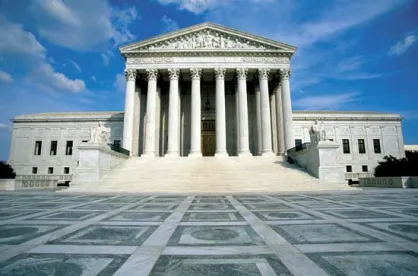The U.S. Supreme Court resolved a split among federal circuits in its May 16 ruling that the public disclosure bar of the federal False Claims Act (FCA) precludes plaintiffs from bringing claims under the FCA based on information obtained through Freedom of Information Act (FOIA) requests for public documents. Schindler Elevator Corp. v. United States ex rel. Kirk, No. 10-188, 563 U.S. ___ (May 16, 2011).[1] The FCA's public disclosure bar generally forecloses qui tam suits that are "based upon the public disclosure of allegations or transactions . . . in a congressional, administrative, or Government Accounting Office report, hearing, audit, or investigation." Id. The Court found that a federal agency's written response to a FOIA request for records constitutes a "report" within the meaning of the FCA's public disclosure bar and, as such, cannot form an independent basis for an FCA claim. See 31 U.S.C. § 3730(e)(4)(A).
Background
Relator Daniel Kirk worked for petitioner Schindler Elevator Corporation (Schindler) for 25 years before resigning in 2003. In 2005, Kirk filed the instant action against Schindler under the FCA, alleging that Schindler had submitted hundreds of false claims for payments under its government contracts. Specifically, he alleged that the company's claims for payments were accompanied by false certifications that it was in compliance with the Vietnam Era Veterans' Readjustment Assistance Act of 1972 (VEVRAA), which requires contractors like Schindler to report certain information to the Department of Labor (DOL), such as how many of their employees are "qualified covered veterans" under the statute. He further alleged that Schindler violated VEVRAA's reporting requirements by failing to file certain required VETS-100 reports, or including false information in the VETS-100 reports it did file. Although Kirk did not specify the amount of damages he sought on behalf of the United States for these false claims, he did estimate that the value of the VEVRAA contracts exceeded $100 million.
To support his allegations, Kirk relied on information he received by way of three FOIA requests to the DOL submitted by his wife, Linda. She requested of the DOL all VETS-100 reports filed by Schindler for the years 1998 through 2006. The DOL responded by email or letter to each of Mrs. Kirk's requests; she received copies of 99 VETS-100 reports filed by Schindler, and was informed by the DOL that it could not locate Schindler's VETS-100 reports for 1998, 1999, 2000, 2002, or 2003.
At the district court level, Schindler moved to dismiss the amended complaint on several grounds, including that the FCA's public disclosure bar deprived the court of jurisdiction. 606 F. Supp. 2d 448 (S.D.N.Y. 2009). The district court granted the motion, finding that some allegations failed to state a claim, and the rest were based on the DOL's FOIA responses, which the court found constituted public disclosure of transactions or allegations in an administrative "report" or "investigation." See 31 U.S.C. § 3730(e)(4)(A). The Second Circuit vacated and remanded. 601 F.3d 94 (2010). Disagreeing with the district court, the appellate court held that an agency's response to a FOIA request is neither a "report" nor an "investigation" within the meaning of the FCA's public disclosure bar. Id. at 103-11.
The Decision
The Supreme Court granted certiorari on the question of whether a federal agency's written response to a FOIA request is a "report" for the purpose of the public disclosure bar. In a 5-3 opinion delivered by Justice Thomas, the Court held that it is, finding that the ordinary meaning of the term "report" in the public disclosure bar subsumes FOIA responses and any attachments to them.
Using the dictionary definition of the word "report," the Court found that the "broad ordinary meaning of 'report' is consistent with the generally broad scope of the FCA's public disclosure bar." Schindler, slip op. at 5. Reading the entire text of the public disclosure bar as an integrated whole, the Court found that the public disclosure bar provides a "'broa[d] sweep.'"Id. at 6 (citing Graham County Soil and Water Conservation Dist. v. United States ex el. Wilson, 559 U.S. ___, ___ (slip op. at 8)).
Given its ordinary meaning in the context and purpose of the public disclosure bar, the Court held the term "report" includes a written agency response to a FOIA request. The Court noted that "[s]uch an agency response plainly is 'something that gives information,' a 'notification,' and 'an official or formal statement of facts.'" Id. (quoting dictionary definitions of "report."). Attachments to those agency responses, too, fall under the FCA's public disclosure bar. "Any records the agency produces along with its written FOIA response are part of that response. . . . Nothing in the public disclosure bar suggests that a document and its attachments must be disaggregated and evaluated individually." Id. at 9. The Court concluded that the DOL's three written FOIA responses to Mrs. Kirk's requests, along with the attached records, were "reports" within the meaning of the public disclosure bar, and remanded on the issue of whether Kirk's suit is "based upon . . . allegations or transactions" disclosed in the FOIA responses.
Implications
In holding that FOIA responses are qualified disclosures under the FCA public disclosure bar, the Supreme Court simply affirmed that if the information on which a claim is based is publicly available through a report, then private citizen action should be subject to jurisdictional challenge. The qualified disclosure may not defeat jurisdiction if the relator is an original source of the information, a statutory check on the dismissal of qui tams where the relator has personal knowledge of the alleged fraud.
Despite its limited holding, the ruling is significant. There are qui tam actions that are derived from legitimate knowledge of the relator and but for personal knowledge of the relator the alleged fraudulent schemes would not be discovered and pursued. It has long been recognized, however, that the qui tam provisions provide only limited jurisdiction for private citizen actions to protect against potential abuse and manipulation by opportunistic suits. Indeed, this concern was at the fore of the Court's consideration. "The sort of case that Kirk has brought seems to us a classic example of the 'opportunistic' litigation that the public disclosure bar is designed to discourage" the majority wrote. "[A]nyone could have filed the same FOIA requests and then filed the same suit." Id. at 10-11. Prohibiting the use of publicly available information via FOIA to sustain private citizen bounty suits under the FCA qui tam actions avoids a potentially major abuse of the qui tam provisions and preserves the FCA's statutory equipoise of balancing the rights of all parties in advancing the public interest of this important statute.
A dissent authored by Justice Ginsburg disagreed with the statutory analysis and invited congressional attention to the decision. Such a suggestion may be taken seriously by Congress, which has attempted to overrule many FCA judicial rulings through amendments to the statute in 2009 and 2010.
There remain a host of open issues with respect to the public disclosure bar. Congress made a number of amendments to the public disclosure bar in the Patient Protection and Affordable Care Act (PPACA) of 2010. These amendments include the limiting of the word "report' to "federal" reports and the new provision that the public disclosure bar does not require dismissal if the government opposes it. The Court made clear that its interpretation of the public disclosure bar did not address the amendments made by PPACA. The Court also noted that there are other open and undecided issues related to the public disclosure bar, including circuit splits on how "based upon" is defined and whether a relator must voluntarily disclose the information to the government prior to it being publicly disclosed.
FCA qui tam actions where the government has declined to intervene, as here, present substantial opportunities to assess the relator's jurisdiction to proceed and such challenges should be a threshold issue assessed under Fed. R. Civ. P. 12(b)(1), which also permits discovery in aid of jurisdiction in appropriate circumstances.
[1]. The Supreme Court opinion can be found at http://www.morganlewis.com/pubs/Opinion-Schindler-v-US_10-188.pdf.




 />i
/>i
